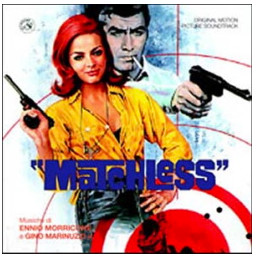MATCHLESS (1967)
Matchless is a broad Italian comedy directed by Alberto Lattuada, which spoofs a number of genres including sci-fi movies and spy films. The film stars Patrick O’Neal as Perry ‘Matchless’ Liston, a secret agent who possesses a ring that makes him invisible for a short time, once every 10 hours. He is in pursuit of an evil criminal mastermind but, at the same time, must evade an enemy agent who also wants the ring. The film co-stars Ira Furstenberg, Henry Silva, and Donald Pleasance poking fun at his own Blofeld role; Morricone co-wrote the score with composer Gino Marinuzzi Jr., and the whole thing was conducted by Piero Piccioni.
As a parody of two of the most iconic genres of the decade, the score is clearly rooted in the musical stylistics of the movies it is parodying, but the dials are all turned up to 11, resulting in a score which drowns in overkill, but is still superbly entertaining if you can get in the right headspace. Morricone’s contribution to the score begins with the “Titoli,” which is an unusual piece of spacey orchestral electronic dissonance underpinned by sultry jazz grooves and vocals, which open the album on an unusual note. The subsequent “Una Dolce Corsa” is a swooning, pseudo-romantic piece for sweeping strings, rock percussion, and Edda dell’Orso’s elevated vocals, intermittently interrupted by a jazzy John Barry-style roaring trumpet that is clearly intended to evoke the espionage cool of James Bond.
“Suspense” is a thunderous explosion of rampaging percussion, throbbing brass, and clamoring vocals, and is intensely energetic, like a chaotic dance piece on psychedelic drugs. This stylistic continues on into “La Danza Delle Trombe,” which adds a Hammond organ and an electric guitar into the same frenzied mix. Later, “Un Pensiero Incantevole” is a sultry, dreamy romance piece for lilting strings, come-hither vocals, and jazzy brushed snares that is typical of the era; the subsequent cue is an arrangement of the same melody for guitar. Finally, “Una Vita Felice” is a sunny, optimistic rock instrumental, which seemingly re-purposes the ‘wa-wa-wa’ vocals from The Good the Bad and the Ugly in a very different setting.
Marinuzzi’s tracks are less impressive that Morricone’s (natch), but still contain some moments worth highlighting. “Un Sogno Ricorrente” is a festival of chipper pizzicato and swooning strings. “Notturno” is a more languid arrangement of the same string theme. “Marcetta Divertente” and “Una Filastrocca Di Note” are pieces of comedy fluff, “Brivido Gelido” is brass-led suspense music, and “Tema Scartato” is a groovy finger-snapping dance band piece. This is the first music I have heard from Marinuzzi, and on this evidence it’s worth seeking out other things he has written.
Morricone’s genre-bending scores have always been something of an acquired taste, but they have always been encapsulations of the European sound that dominated films like this at the time. It’s a mixed bag of music that leaps from frantic dance music to swooning romance at a pace that will make your head spin, but anyone who appreciated the then-contemporary sounds of that era will enjoy it. The score for Matchless has been released on LP and CD a couple of times over the years, but my personal recommendation – and the score being reviewed here – is the 2011 release from Italian label Legend Records.
Track Listing: 1. Titoli (2:31), 2. Un Sogno Ricorrente (1:36), 3. Una Dolce Corsa (1:37), 4. Notturno (2:33), 5. Suspense (3:13), 6. Marcetta Divertente (1:16), 7. La Danza Delle Trombe (3:25), 8. Una Filastrocca Di Note (1:05), 9. Un Pensiero Incantevole (1:49), 10. Brivido Gelido (1:46), 11. Un Pensiero Incantevole (Per Chitarra) (1:48), 12. Una Vita Felice (2:26), 13. Tema Scartato (2:48), 14. Una Vita Felice (#2) (2:24), 15. Ho Paura (1:18), 16. Titoli Di Coda (2:58). Legend CD-41DLX, 34 minutes 07 seconds.











